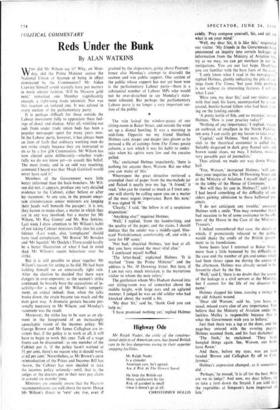POLITICAL COMMENTARY
Reds Under the Bunk
By ALAN WATKINS
Al THY did Mr Wilson say it? Why, on Mon- VV day, did the Prime Minister accuse the National Union of Seamen of being in effect dominated by the Communists? Mr Aidan Crawley himself could scarcely have put matters in more sinister fashion. It'll be Moscow gold next,' remarked one Member (significantly enough, a right-wing trade unionist). Nor was this reaction an isolated one. It was echoed in every section of the parliamentary party.
It is perhaps difficult for those outside the Labour movement fully to appreciate these feel- ings of shock and dismay. After all, winkling out reds from under trade union beds has been a popular newspaper sport for many years now. In. the Labour party, however, it has always been an item of faith that ordinary working -men do not strike simply because they are instructed to do so by a few glib Communists. Mr Wilson has now elected quite deliberately—whether truth- fully we do not know yet—to assault this belief. The most ironic, and in an odd way touching, comment I heard was that 'Hugh Gaitskell would never have said it.' Members of the Government were little better informed than the back-benchers. Mr Wil- son did not, it appears, produce any very detailed evidence to the Cabinet, either before or after his statement. At any rate, in the present uncer- tain circumstances senior ministers are keeping their, heads well beneath the parapet: it is not, they hasten to make clear, a matter in which they are in• any way involved, but a matter for Mr Wilson, Mr Ray Gunter and Mr. Roy Jenkins. Lasi week I drew attention to Mr Wilson's habit Off not taking Cabinet ministers fully into his On- fidence. (Last week, also, 'complacent' should have read complaisant, `Mr Brown' Mr Bowden and `Mr Squelch' Mr Quelch.) There could hardly be a better illustration of what I had in mind than Mr Wilson's recent behaviour over the strike.
. But it is still possible to piece together Mr Wilson's reason for acting as he did. He had been holding himself on an unnaturally tight rein. After the- election he decided that there were dangers in over-exposure; as the seamen's strike continued, he bravely bore the accusations of in- activity—for a man of Mr Wilson's tempe& ment, an ordeal indeed; then, when the talks broke down, the strain became too much and the dam gave way. A dramatic gesture became per- sonally necessary to Mr Wilson; and. Monday's statement was the result.
Moreover, the strike has to be seen as an ele- ment in the foreground of an increasingly apocalyptic vision of the incomes policy.. Mr George Brown and Mr James Callaghan are in- sistent that, if the policy is to work at all, it will have to begin to work this year. Talk of a wage freeze can be discounted: as one member of the Cabinet put it, 'if the policy hasn't worked at 34 percent, There's no reason why it should work at nil per cent.' Nevertheless, as Mr Brown's stern reintroduction of the Prices and Incomes Bill has shown, the Cabinet has now decided to take the incomes policy seriously—until, that is, the judges or the doctors put in their next pay claim in around six months' time.
Ministers are uneasily aware that the Pearson recommendations are well above the norm. Hence Mr Wilson's threat to 'veto' any rise, even if granted by the shipowners, going above Pearson: hence also Monday's attempt to discredit the seamen and win public support. One section of the public whose support has not yet been won is the parliamentary Labour party—there is a substantial number of Labour MPs who would not be over-disturbed to see Monday's state-. ment rebound. But perhaps the parliamentary Labour party is no longer a very important sec- tion of the public.














































 Previous page
Previous page